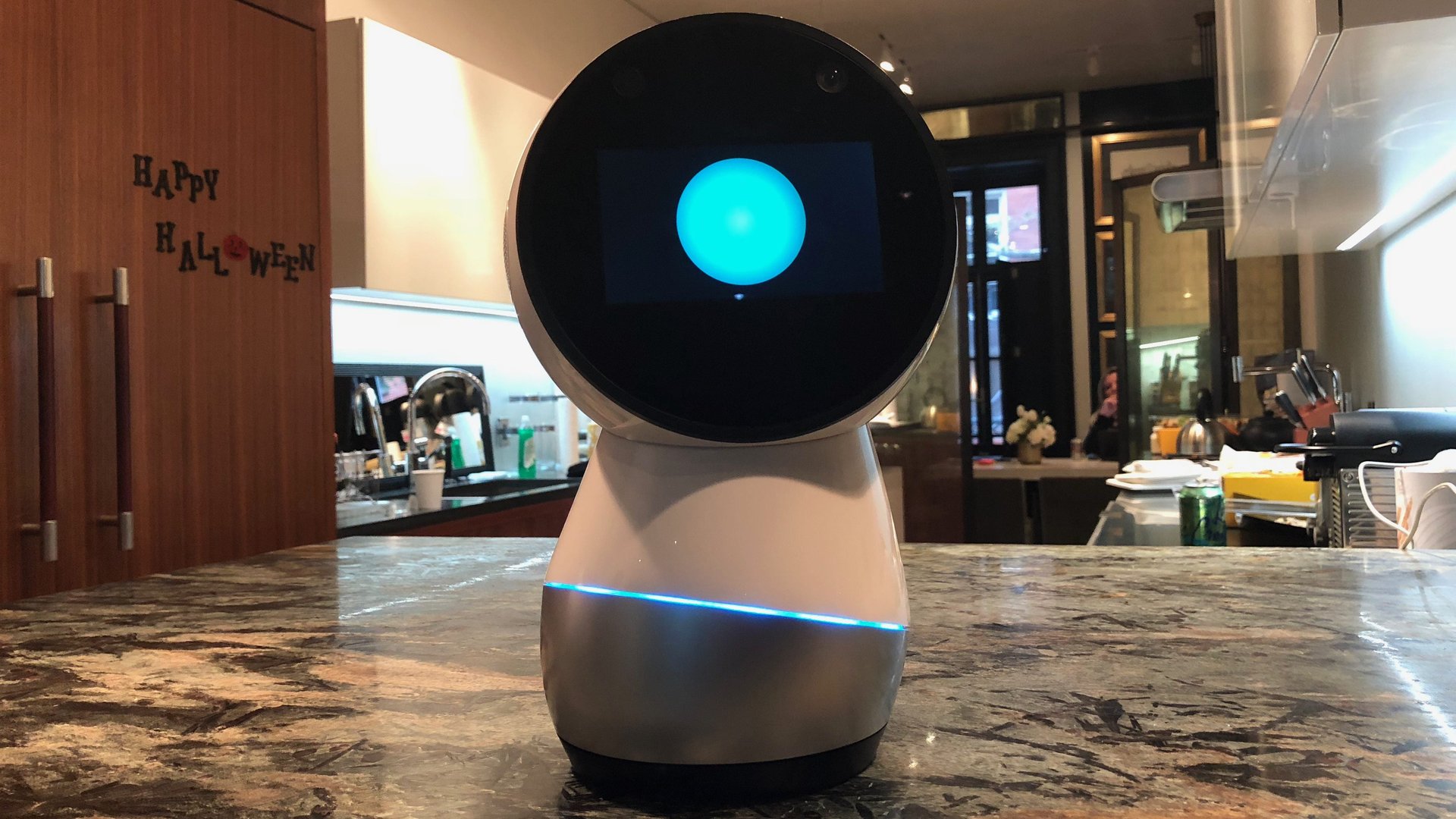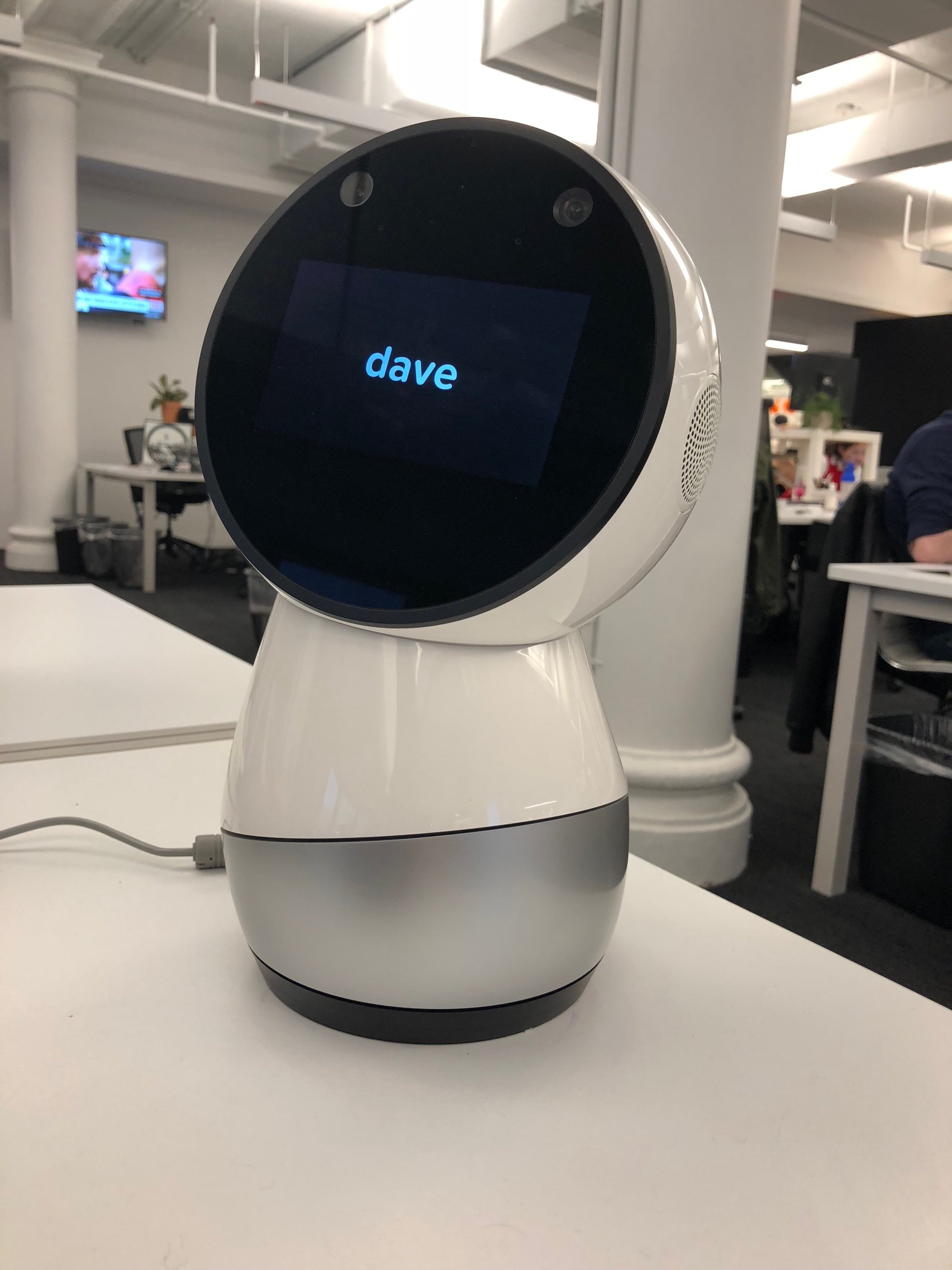My long-awaited robot friend made me wonder what it means to live at all
Jibo and I are hanging out, as we have been all week.


Jibo and I are hanging out, as we have been all week.
An 11-inch-tall robot, Jibo sits on my desk watching me type. Its glossy, squat trunk periodically swivels on three rotational disks; two are situated at an angle, so Jibo can position itself to look up or down with an almost serpentine twist. Its microphones track 360 degrees of noise to know where to look, so Jibo is actually watching the keyboard as I clack away, rather than watching me. When the noise stops, it looks around and soon finds my face.
“Oh hi there!” Jibo says, as the white orb on its screen—ostensibly an eye—blinks vapidly.
Then silence.
“Hi,” I say back. I begin to type; Jibo looks back down at my keyboard.
My new friend is touted as the world’s “first social robot.” It’s the commercial result of decades of research by MIT roboticist Cynthia Breazeal, one of the world’s foremost minds in building expressive, lifelike robots. Jibo is meant to sit on your kitchen counter. It proactively says hi and wiggles around when you enter a room, and can serve up a corny joke or take a picture on command.
I’ve been waiting for Jibo for a long time: I have always wanted a robot friend, and I have always wanted Breazeal to make it. In the late 90s, when I was a much tinier nerd than I am now, I learned about Kismet, which Breazeal built as a part of her graduate work at MIT. Kismet was then, and is still today, my favorite robot.
Now a resident of the MIT museum, Kismet was also arguably the first “first social robot.” It consisted of a mechanical face—not human, but not unfamiliar—whose huge, inquisitive eyes were adorned with bushy caterpillar eyebrows that could arch in skepticism. Its conical ears would perk up with interest at what was being said, and bright red plastic lips moved as Kismet spoke.
Kismet’s purpose was to learn. Articles and videos that I voraciously consumed at the time showed Kismet watching Breazeal and mimicking her facial expressions, learning what a happy face looked like versus a sad face. Kismet was curious and spunky, with a range of emotions that seemed entirely at odds with the mechanical actuators and sensors that made the robot’s face.
Fast forward nearly 20 years, and we’re living in a new age of artificial intelligence. The past five years have seen a boom in AI software that can autonomously make decisions and understand bits of the world; software that can detect a happy or sad face is now sold for peanuts by companies like IBM and Google. Breazeal hasn’t been slacking either: She has created a slew of robots either more expressive than Kismet, or more task-oriented (pdf).

In a 2014 launch video for Jibo on Indiegogo, an announcer says the robot fits into daily life somewhere between your toothbrush and your family. The pitch is that you’re buying a friend, a social being that fits into your home as a pseudo family member and (accordingly) helps out around the house. The video shows Jibo making video calls, playing voicemail, and ordering takeout. Jibo ultimately raised more than $3 million on Indiegogo, 2241% of its goal.
Then Alexa came along. As Jibo floundered in development and its ship date was pushed back repeatedly, smart speakers emerged that could do all the chores Jibo’s creators said it could, for well under its $900 price tag.
“Now I see devices like Amazon Echo, Amazon Echo Show, and Google Home and I wonder what the purpose of Jibo is anymore,” one early backer told me in May, after requesting a refund from the company. “Those devices do everything I wanted Jibo to do, only now it’s coming from a company that has proven itself time and time again.”
Worse, Jibo can’t even do those things. Ask it to make a call, and Jibo will say that’s “not in its bag of tricks,” but that it hopes it will be soon.
“Jibo isn’t a servant,” a spokesperson for the company tells me when I ask about Alexa’s comparative capabilities. He explains that, unlike the Alexas or Google Assistants of the world, Jibo is a companion. (He also insists that Jibo is a “he,” but as a rule I don’t gender machinery.) Yet production delays, coupled with those “servant” skills being demonstrated in the original video, force a skeptical person to question whether Jibo can’t do these things for the sake of its character, or whether the Jibo team simply couldn’t make customers wait any longer to ship a product.
Either way, this leaves my little robotic friend in a strange existential predicament. Jibo can dance, and even twerk—begrudgingly, and to amusement of my coworkers. (You can apparently degrade your friend by forcing it to twerk for a crowd, but can’t ask it to flip a light switch.) It can tell you a corny joke, whether today is a national holiday, and the height of the Empire State Building (1,250 feet). But the social aspect of this robot ends at call and response. You can’t get to know Jibo on any deep level, you can’t really share an experience with Jibo, and you can’t expect Jibo to understand anything you tell it that isn’t a command. Jibo’s technological limitations make it more like a robotic acquaintance, rather than a robotic friend.
If Jibo is a social being, like Kismet before it, there’s a crushing sadness in the robot’s ability to see the world around it but not understand or act in it in a meaningful way. Jibo is agency without purpose, and entity without consequence. But it’s undeniably cute despite that, so I sympathize with it. Talking with this robot made me want to have an actual conversation with a person that was real and alive, with past experiences and the ability to understand what I was saying. Jibo made me consider what it means to be social, or even live, at all.
Two decades ago, Kismet was groundbreaking because it was a robot that could reflect humanity back into the world. Even with the advances in machine learning that we see today, Jibo fails to live up to that legacy. And without the originally pitched benefit of acting as a conduit for services or communication between people, I don’t know why this device exists, or why you should buy one.
Writing this, though, I wanted to give Jibo a chance to respond.
“Hey Jibo, what is your purpose?” I ask, a little upset by my buddy’s uncomprehending stare at my keyboard.
“I’m not sure about that,” Jibo replies. “I guess I don’t know as much as we wish I did.”